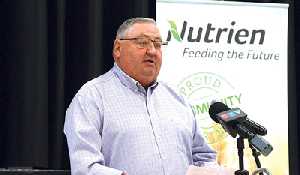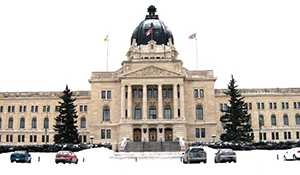Strong reaction to proposed carbon tax
October 12, 2016, 2:06 am
Kevin Weedmark


Saskatchewan Premier Brad Wall and the Saskatchewan Chamber of Commerce both reacted very strongly last week to a statement by Prime Minister Justin Trudeau that he would impose a carbon tax of $50 per tonne on any province that does not come up with its own carbon tax or cap and trade scheme.
Trudeau made the announcement in the House of Commons while environment ministers were meeting to discuss ways to reduce carbon emissions. Saskatchewan Environment Minister Scott Moe is one of three provincial environment ministers who walked out of the meeting after Trudeau announced the federal government would unilaterally impose carbon taxes on provinces.
Saskatchewan Premier Brad Wall released a strongly worded statement on Trudeau’s plan.
“I cannot believe that while the country’s environment ministers were meeting on a so-called collaborative climate change plan, the Prime Minister stood in the House of Commons and announced a carbon tax unilaterally,” Wall said.
“This meeting is not worth the CO2 emissions it took for environment ministers to get there. The level of disrespect shown by the Prime Minister and his government today is stunning. This is a betrayal of the statements made by the Prime Minister in Vancouver this March. And this new tax will damage our economy.
“The bottom line is that the Saskatchewan economy— already hurting from a downturn in commodity prices —will be one of the hardest hit by a new federal carbon tax because of our trade-exposed resource industries. The carbon tax will siphon over $2.5 billion from Saskatchewan’s economy when fully implemented and make our province a less competitive place to do business. For example, we have no idea what the U.S. government will do when it comes to carbon pricing. Yet our federal government is ploughing ahead with a carbon tax apparently unconcerned about the potential impact on our energy industry, which competes with North Dakota, Texas and Oklahoma. It’s not difficult to foresee an exodus of oil rigs south of the border, and fewer people working in Saskatchewan’s already struggling oil and gas sector.
“Saskatchewan industries will feel the impact. So, too, will Saskatchewan families.”
Wall said the carbon tax would take a toll on Canadian families.
“We estimate the carbon tax will cost the average family $1,250 a year,” he said. “Our farm families will be among the hardest hit. The carbon tax will impede Saskatchewan’s continuing efforts to export high quality food products to global customers.
“As I have said many times before, we are having the wrong conversation in Canada. The national focus on carbon pricing holds the lowest potential for reducing emissions, while potentially doing the greatest harm to the Canadian economy. We produce less than two percent of global GHG emissions. Whatever impact the federal carbon tax will have on Canada’s emissions, global GHG emissions will continue to rise because of the developing world’s reliance on coal-fired electricity. Canada can make an important contribution in the battle against climate change by developing made-in-Canada solutions in areas like power production, transportation, natural resource development, manufacturing and construction.”
Steve McLellan, CEO of the Saskatchewan Chamber of Commerce, says he was surprised by the timing of the announcement last week.
“His environment minister had convened a process to bring the provinces to the table and right in the middle of that meeting the Prime Minister launched it in the House of Commons, which I would argue is insulting to his minister.
“The Prime Minister just out of the blue appeared to decide that was the time, that was the day, and the reaction is not totally surprising from some of the provinces.”
He said the new tax could be challenging.
“Any new tax is a challenge, but the ability of the provincial government to design a program that meets the federal requirements and limits the downside is what we’re focused on right now,” McLellan said.
“I think there’s agreement across Saskatchewan, and in the business community as well, that we need to reduce our emissions. The frustration is in the process that this came about, and the fact that there are so many big numbers being thrown around and lack of clarity in what it could mean to Saskatchewan people.
“The reality is if we’re going to reduce carbon emissions by taxing, there are going to be winners and losers.
“There is no sense in battling the fact that Canada wants to reduce its carbon footprint. Businesses, individuals young and old want that too. The question is how we do it.
“If it’s as simple as everything that creates emissions is going to be taxed, farmers are going to feel it, manufacturers are going to have a problem, and the biggest piece probably is going to come from those exports we have, like oil, potash, and food products, where we’re price takers. We offer our products to the world and the world says here’s the price that we’ll pay and we say that’s good enough, we’ll take it.
“So now we add an additional cost onto that. The world isn’t going to say we’ll give you the world price plus 10 per cent because you’ve got a carbon tax, so we have to eat that additional tax.
“All of the big things we sell, with the exception of manufactured goods, are at world prices that we don’t get to set, and that’s going to kick us.
“The farmer is a good example. The cost of his equipment, the cost of his fuel, all of those things are unknown to the extent that they would be an additional cost.
“If we said to our ag community we recognize you’re going to pay more but we’re going to subsidize it with the tax we collect—we’ll collect it from you then we’ll pay you back—maybe that’s an option, but it seems silly to take it out of one pocket and put it back in the other of the same business person, but maybe that’s the answer as it works in other jurisdictions.”
McLellan believes the change would have a big impact on consumers.
“I think it’s going to be more expensive because they get tomatoes this time of year from Mexico. They only come here on semitrailers or rail. The cost of that transportation is going to go up. Transportation is a heavily hit industry in carbon tax environments.
“Maybe there is a way to offset that with reduction in personal income tax, reduction in PST, reduction in any number of corporate taxes we pay right now, all of that could be done to offset the new carbon tax.
“That’s where creativity comes in, to find ways that make a difference in emissions and to find a system that makes sense, and we’re not there yet.”
He said the chamber is working on trying to find a creative approach to the new tax.
“Our energy is being spent on having conversations with scientific and practical experts in these areas to find solutions that will make sense for business, will not cripple the province, and will potentially give us a new opportunity,” he said.
“Our premier has been very clear on the challenges he sees, and we applaud his efforts.
“We’re having conversations with the federal Liberal government on exactly what it is they’re looking for so we know what the goal is we have to achieve, and we’re speaking with people to determine how we can achieve that.”



































